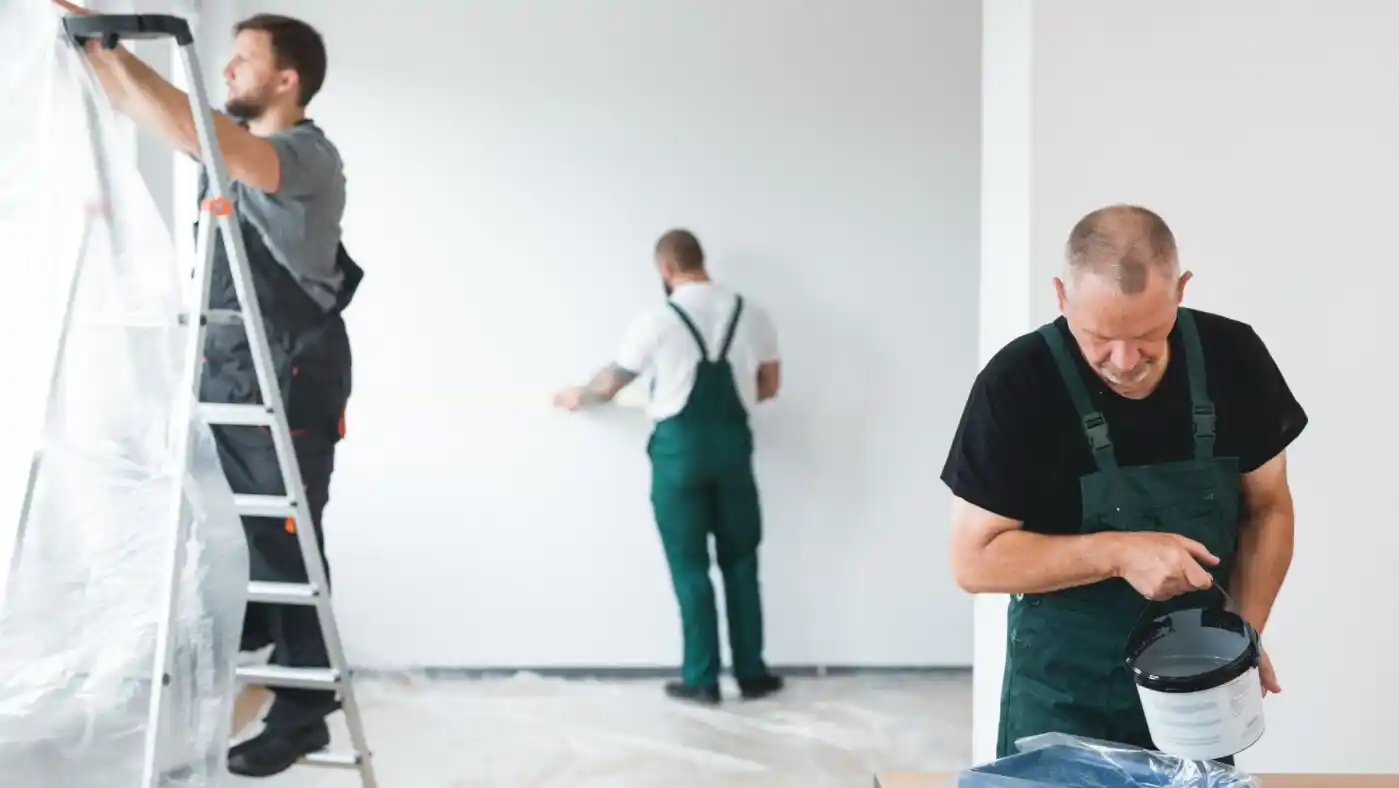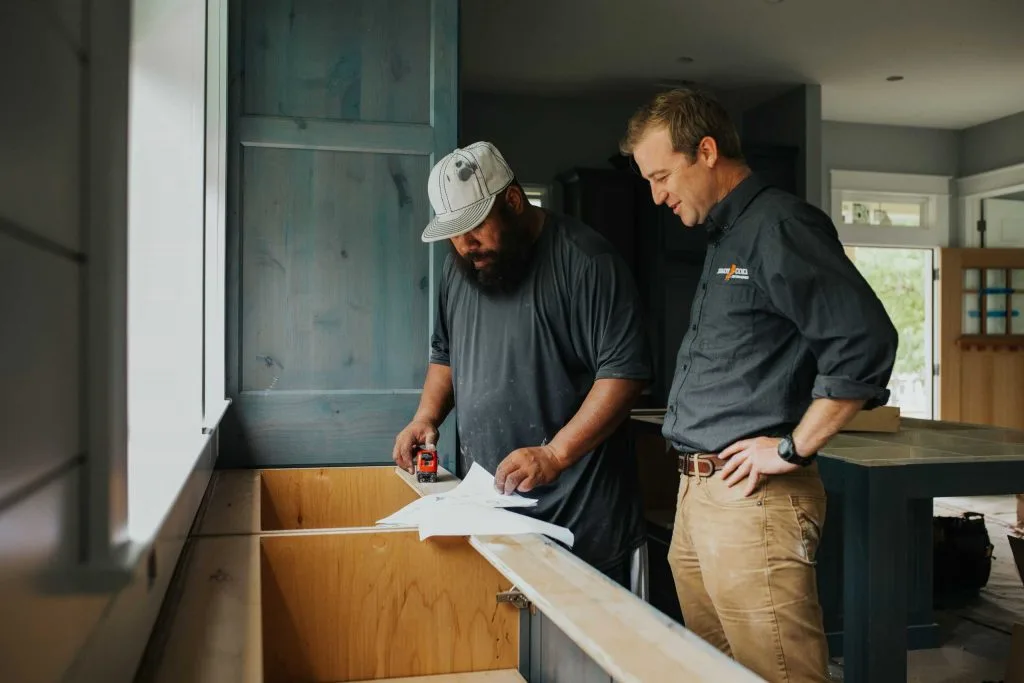
Customers rely on professional painters not just to get the job done—but to do the project efficiently and cleanly. As a result, pro painters need top-quality tools to help them avoid costly mistakes and last-minute store runs and deliver high-quality results every time.
Using broken, outdated, or incomplete toolkits is a major logistical oversight that can derail a well-planned workflow and cause delays that could harm future business.
We’ve compiled a list of must-have professional painting tools and equipment to complete every job successfully and wow your customers.
Painting Tools and Equipment List
- What Painting Tools and Equipment Do Professional Painters Need?
- 1. Paint Brushes
- 2. Paint Roller and Frame
- 3. Paint Sprayers
- 4. Masking Tape and Tape Measure
- 5. Patching Knife
- 6. Sandpaper/Sanding Sponges
- 7. Ladders
- 8. Solvents
- 9. Paint Roller Trays
- 10. Rags and Drop Cloths
- 11. Paint Stirrer Sticks
- 12. Caulk Gun
- 13. Wall Cleaners
- 14. Extension Pole
- 15. Safety Hard Hats
- 16. Safety Goggles
- 17. Respirator Mask
- 18. Can Opener
- 19. Safety Toolkit
- 20. Painting Contractor Software From Housecall Pro
- Housecall Pro – The Best Digital Tool for Painting Contractors
What Painting Tools and Equipment Do Professional Painters Need?
1. Paint Brushes
For a clean, smooth finish, use high-quality, durable paint brushes with natural or synthetic bristles made from nylon and polyester. These brushes work well with water-based paints and are also easy to clean.
Stock your toolkit with at least two types of brushes:
- A large wall brush to cover large areas swiftly
- An angled sash brush for precision work such as painting trims and edges
Price: $20-$30
2. Paint Roller and Frame
A paint roller allows you to spread out the paint evenly and swiftly. The size of the roller fabric, also known as the “nap,” is crucial. A ¾-inch nap absorbs more paint, allowing you to evenly cover a rough surface and its crevices.
For best results, use 9-inch roller frames for walls and ceilings and 4-inch frames for smaller areas such as doors and cabinets.
Price: $15-$30
3. Paint Sprayers
Paint sprayers allow you to apply paint more quickly and evenly than brushes and rollers, especially in hard-to-reach areas and larger projects. They also provide a smoother finish.
Choose from three types of spray painting tools and equipment:
- Airless sprayers are ideal for large surfaces
- High-volume, low-pressure sprayers are for detailed paint jobs.
- Pneumatic sprayers are suited for commercial paint jobs.
Price: $40-$500
4. Masking Tape and Tape Measure
Masking tape can help you achieve clean edges while painting around baseboards, skirting boards, window trims, sockets, and light switches.
A tape measure is another handy tool that helps you accurately measure the surface area you need to paint. This can help you determine the amount of paint you need while keeping your budget in check.
Price: $20-$30
5. Patching Knife
A patching knife is a flat knife with a wooden handle that lets you level surfaces or repair holes and defects in walls before painting them. You can also use them to scrape off old paint or remove excess filler.
Choose from the following knives:
- A putty knife to apply and spread plaster, putty, or spackle
- A taping knife to apply joint compound for drywall jobs
- A joint knife to smoothen material on larger surfaces
Price: $6-$13
6. Sandpaper/Sanding Sponges
Before painting, painters sand down rough, uneven surfaces or defects to achieve a smoother finish. This allows the paint a good “gripping surface” and creates adhesions that help the paint stick. This trick prevents the wall from peeling, helping the paint job last longer.
Depending on the surface material, you can use sanding sponges with varied grit levels (degrees of coarseness), such as 100, 150, or 220.
Price: $5-$10
7. Ladders
Ladders and scaffolding are necessary for any painting project, allowing you to safely and accurately reach remote areas. Platform ladders are a popular choice, as their spacious berth can accommodate a range of painting supplies, allowing for a comfortable workspace.
An A-frame ladder is another excellent option. This ladder has wide treads and a strong frame that allows you to paint comfortably for long hours. You might also want to consider investing in a simple stepladder or an extension ladder, which is useful for painting lofty foyers and ceilings.
Invest in one- or two-tier frame scaffoldings for residential painting projects. They range in width from 2 feet to 5 feet, providing ample storage space for paint equipment.
Price: $50-$100
8. Solvents
Paint solvents dilute the paint, creating a liquid mixture that can be applied uniformly to surfaces. After finishing a project, solvents can also help you clean dried paint from brushes, rollers, and other applicators.
You can choose from a variety of solvents depending on the surface material you are to paint, such as turpentine, acetone, xylene, benzene, and naphtha.
Price: $12-$40
9. Paint Roller Trays
Roller trays are flat containers that hold paint, allowing painters to dip and apply paint easily. Plastic roller trays are ideal because they are easier to maintain and are less expensive.
After the paint dries, simply peel it off the tray, cover it with a bin cover, and reuse it. Alternatively, you can use disposable plastic roller trays.
Price: $10-$20
10. Rags and Drop Cloths
Drop cloths are huge fabric sheets made of plastic or canvas that catch errant paint splatters, spills, and drips, helping protect non-paint surfaces. Rubber canvas drop cloths are popular among painters due to their anti-slip and durable properties. You can also include smaller rags in your kit to clean smaller surfaces or stray spills.
Price: $5-$20
11. Paint Stirrer Sticks
Fresh paint canisters often have oil floating at the top, which you must stir well with a stick before applying. Paint stirrer sticks also come in handy when you need to stir and mix various colors to produce an even tone. Large hardware stores such as Home Depot often offer them for free.
Price: $20 for 100 pieces
12. Caulk Gun
Caulk guns help prep a surface before a paint job. You can use them to patch gaps and cracks in walls or woodwork, which helps keep moisture out. You can also use caulk guns to quickly apply sealant to large surfaces.
Price: $15-$25
13. Wall Cleaners
Wiping down dusty walls is a must before starting a paint job. This calls for basic tools such as a mild detergent or soap, water, a clean microfiber cloth, and a tack cloth to help remove fine dust and grime.
Some painters prefer using specialized wall cleaners; however, this isn’t necessary. Lukewarm soap water can help you do the same job at a fraction of the cost.
Price: $5-$10
14. Extension Pole
You can attach this useful tool to your paint rollers and extend them to paint difficult-to-reach surfaces, nooks, and high ceilings. It is an excellent alternative to using a ladder for a small-scale painting project.
Price: $20-$50
15. Safety Hard Hats
Large-scale painting projects, especially commercial ones, require painters to work at heights or adjacent to chaotic construction sites. Wearing safety helmets is a must under such circumstances and can help prevent injuries.
Alternatively, you can use a painter’s cap to shield your hair from paint splatters during low-risk painting projects.
Price: $50-$100
16. Safety Goggles
Safety goggles can help protect your eyes from irritation and injury brought on by paint splatters, overspray, or sanding. Use high-quality eyewear with splash-resistant features and side-eye coverage. If you’re doing a lot of spray painting, you should invest in a full face shield.
Price: $15-$20
17. Respirator Mask
Oil-based paints often emit toxic fumes from volatile organic compounds (VOCs) that can make you ill with prolonged exposure. Besides proper ventilation in your workspace, you must also invest in respirator masks that prevent you from inhaling these fumes. Masks also protect you from dust while sanding or brushing.
Price: $20-$50
18. Can Opener
Invest in a strong and durable can opener to ensure quick and efficient access to paint. Paint cans have a tight seal and can get stuck. Prying them open can be difficult, and without can openers as leverage, you may end up wasting time.
Price: $8-$15
Get In Touch: 858-842-5746
Let us earn your trust
On average, Pros increase monthly revenue generated through Housecall Pro by 50% after their first year.
See plan options and feature breakdown on our pricing page.
19. Safety Toolkit
Painting jobs pose as much risk as construction work. They need painters to work at heights and remain exposed to dangerous chemicals and solvents, increasing the likelihood of accidents and mishaps.
While you can’t eliminate the possibility of these accidents, you can plan for them. Investing in a first aid kit that addresses the needs of a high-risk work setting is a must to protect yourself and your crew. Some items to include in this toolkit are:
- Skin-cleansing agents
- Eyewash solutions
- Antiseptic wipes or creams
- Bandages, gauze, and adhesive tape
Price: $50-$100
20. Painting Contractor Software From Housecall Pro
Running a painting business is more than just applying a fresh coat of paint. It also involves management duties, which you can carry out with the help of the right software. Housecall Pro is one of the best in the business, offering seamless digital support to help you manage multiple aspects of your painting business. It includes features such as:
- Job Scheduling: Swiftly schedule, assign, and track jobs.
- Job Cost and Estimating: Determine job costs and create professional estimates in minutes to generate steady revenue.
- Online Booking: Help customers book painting services easily.
- Sales and Lead Pipeline: Build, nurture, and convert leads through an integrated CRM.
- Automated Notifications: Send updates and reminders to hundreds of customers in one go.
- Invoicing and Payments: Create and send digital invoices on the go to get paid faster.
- Pictures and Private Notes: Add project photos, notes, and messages for your painting crew to ensure consistency and quality.
Housecall Pro – The Best Digital Tool for Painting Contractors
Every minute spent juggling admin work is time lost on landing your next client. The right painting business software works like an efficient manager, handling the administrative and operational aspects of your business. That way, you can focus on delivering flawless painting results and growing your revenue.
Start your free trial with Housecall Pro today and experience the difference!






